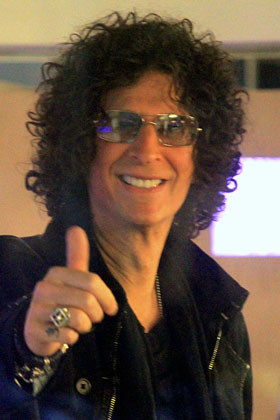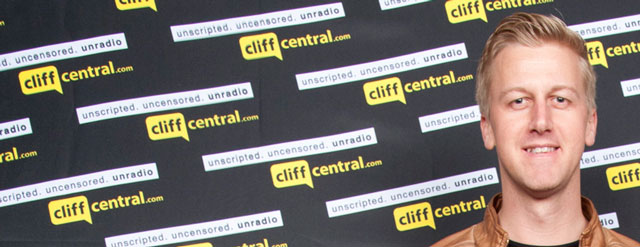
As I step into a rather ordinary looking building in the drab Johannesburg suburb of Rivonia, I get the sense there is a buzz in the air, even though there’s no one about as I walk past an unmanned reception desk.
Stuck on the desk is a handwritten note instructing interns to head upstairs. That’s where Gareth Cliff, until recently the host of 5FM’s hit breakfast show, is holding auditions for Cliff Central, his high-profile Internet radio venture.
So, why did South Africa’s own Howard Stern quit 5FM — where arguably he had it all — to strike out on his own on a medium that, so far, isn’t drawing anywhere near the same audiences as FM radio?
We’ll get there in a moment, but first join me as I enter Cliff’s new digs.
The Cliff Central studio is located in the corner of a giant room, with two large, glass partitions that allow visitors to watch the on-air shenanigans as they happen. As I walk in, two of Cliff’s sidekicks, Damon Kalvari and Mabale Moloi, are working at a large, round table. A few people, who look like interns, are wandering about, looking suitably productive.
Apart from a large couch and a few other bits of scattered furniture, there is a lonely server cabinet handling the Internet feeds — essentially the core technology powering Cliff’s new venture.
As I sit down with Cliff, who has just finished his Thursday show, in which he’s clearly starting to get into a new rhythm, it’s with a sense of expectation. For the past 14 years, there have been few South African radio personalities who’ve generated quite as much controversy as Cliff. Though I’m armed with questions, it’s difficult to know where the interview is likely to go. I imagine I’ll need to rein him in.

The lanky, blonde-haired Cliff began his career in radio at Tuks FM, the campus radio station at the University of Pretoria. “On my first day on campus, I realised I was going to have a lot of time on my hands,” he tells me as we settle into the interview in a small room away from the noisy studio space. “I bunked lectures because I was bored, but my classes were also very spread out. I needed to kill time, so I signed up at the campus radio station.”
Cliff did his first show three weeks later. In his two-and-a-half years at Tuks, he admits he did some “bizarre” shows. “In fact, all of it was bizarre. We were students, and we could get away with anything.”
In those early days, he was “nervous as hell” and put a lot of work into everything. “It always sounded like shit. I was terrible back then. I think the only people who listened to my first show were my mom and dad.”
Cliff, now 36, says he was suspended several times. He was eventually fired from campus radio for doing “some really outrageous stuff”. The show that ultimately led to Tuks FM sacking Cliff was one where when he held a competition, live on air, measuring penis sizes, with the results judged by a stripper from Teazers.
Six black slaves
He must have been channelling Howard Stern, the US shock jock.
Indeed, Stern became an influence on the young Cliff. But it was not until a friend, Marcus Sorour, brought back audio tapes of Stern’s live radio antics that Cliff sat up and noticed the real potential of radio.
“I was blown away. Here was a guy who had the same ideas as me and he had them long before I came on the scene,” Cliff says.
Cliff actually met Stern in 2000 in New York. “I mailed his producer, Gary Dell’Abate … and said I would really like to meet him.” Dell’Abate agreed and Cliff spent 20 minutes in-studio with Stern, who introduced him on-air, in his American drawl, by saying: “So, this dude, Gareth Cliff, is a deejay and talk show host from South Africa, and he has just been carried in by six black slaves.”
Before he left the studio, Stern gave Cliff three words of advice, words he says carries with him to this day: “Just be yourself.”

At the time, Cliff had already been working at Talk Radio 702, on John Robbie’s afternoon talk show, and later went on to host the Gauteng station’s popular breakfast show, which he took over from radio legend John Berks. At the end of 2002, 5FM approached Cliff, and he spent the next 12 years at the SABC-owned music station.
Cliff’s tenure at 5FM was not without its share of controversy. “I’m surprised I wasn’t fired over any given opportunity in that time.”
One incident, in 2004, which got Cliff suspended for two days, involved an on-air interview with “Jesus”. The interview was a parody of Mel Gibson’s Passion of the Christ, which was released that year. Cliff is an outspoken atheist.
Over the years, Cliff has had many complaints lodged against him by outraged listeners at the Broadcasting Complaints Commission of South Africa. For Cliff, it was time to get “unhinged”, to sever ties with the constricting world of regulated radio.
Cliff wanted to do things his way, without anyone telling him what he could and couldn’t say and do. Enter Cliff Central.
He made the leap for two reasons. First, it was about the audience. With news, weather, advertising, time updates, music and traffic updates, there was no time to produce quality content. “I could no longer give them the things I wanted to because the platform I was on was so over-commercialised.”
Second, it was about having the freedom to do the things he wanted to. “I can make the shows shorter or longer, do the news and sports bulletins in the way that I like to, which is conversational, not forced. But that is all that these empty-headed, dumb deejays can do, churning out these platitudes, when they should be entertaining the audience by being interesting, intelligent or inspiring.”
For Cliff, it was important to make a change. He had given 5FM 10 years of his life. “I do feel like it wasn’t wasted, I had a great time there and it was a great way to connect with the future audience that will make the decisions.”

But will it work? Are South Africans ready to embrace online radio, or has Cliff jumped ship too soon? Cliff says Internet radio is a “natural evolution” and that his audience is generally tech-savvy. “I think the timing here is very important. It is inevitable that the cost of data will come down, but it was always one of my main concerns.”
Deals like MTN’s uncapped access to Cliff Central will certainly help. But the question remains: why would audiences move from FM, which is often easier to access (for example, when driving), not to mention free? “Because what they are being offered there is frankly beneath them,” Cliff says confidently.
Cliff’s new show is also broadcast on Comedy Central on DStv from 7.30 each morning. Radio is a lot more “real” than TV, he says, but the reason for the DStv gig is he needed a “toehold in traditional media”.
“TV has always been seen as more glamourous than radio, it’s always been considered the big star, first-born child of the media business, while radio is the ugly ginger stepchild that people kick to the curb — it’s a utilitarian thing, not prestigious.”
It was important for Cliff to position Cliff Central in the minds of the audience and advertisers as something that is not just online radio.
Mobile is also important, he says, and is the reason he’s tied up with WeChat, the chat service and social network owned by Naspers affiliate Tencent. Users can listen to Cliff Central from within the WeChat app. Cliff says the smartphone represents the future of content delivery.
As the interview is wrapping up, Cliff’s agent, Rina Broomberg, pops her head into the room to let him know that it’s time for his next appointment.
In the short time I spend with Cliff, it’s clear to me that he’s not afraid to say it like it is and that he has a refreshing outlook on modern media.
Though he has plenty of naysayers, Cliff could just change the way many South Africans consume radio. And he probably won’t even need a stripper and a measuring tape to do it. — © 2014 NewsCentral Media

